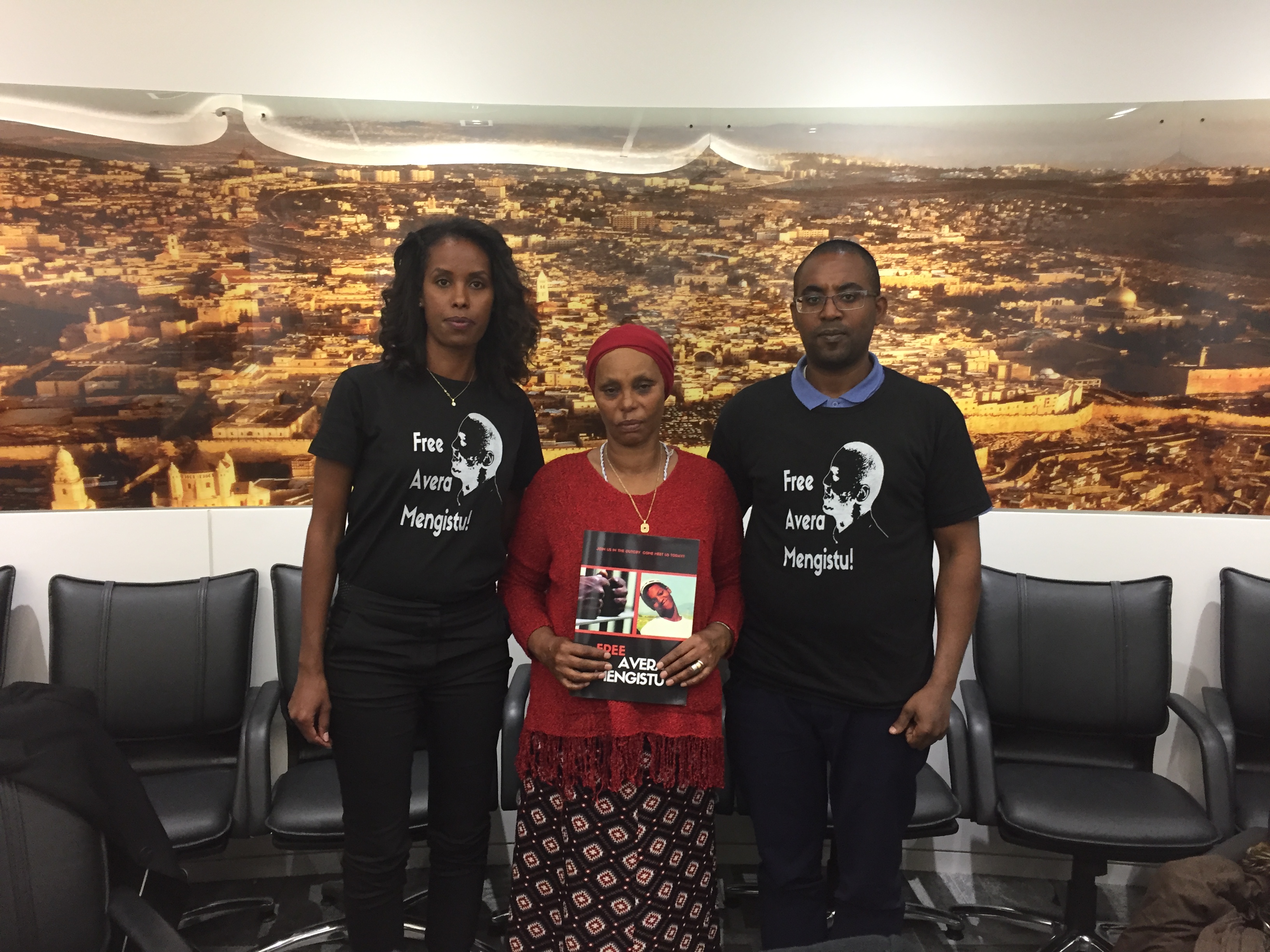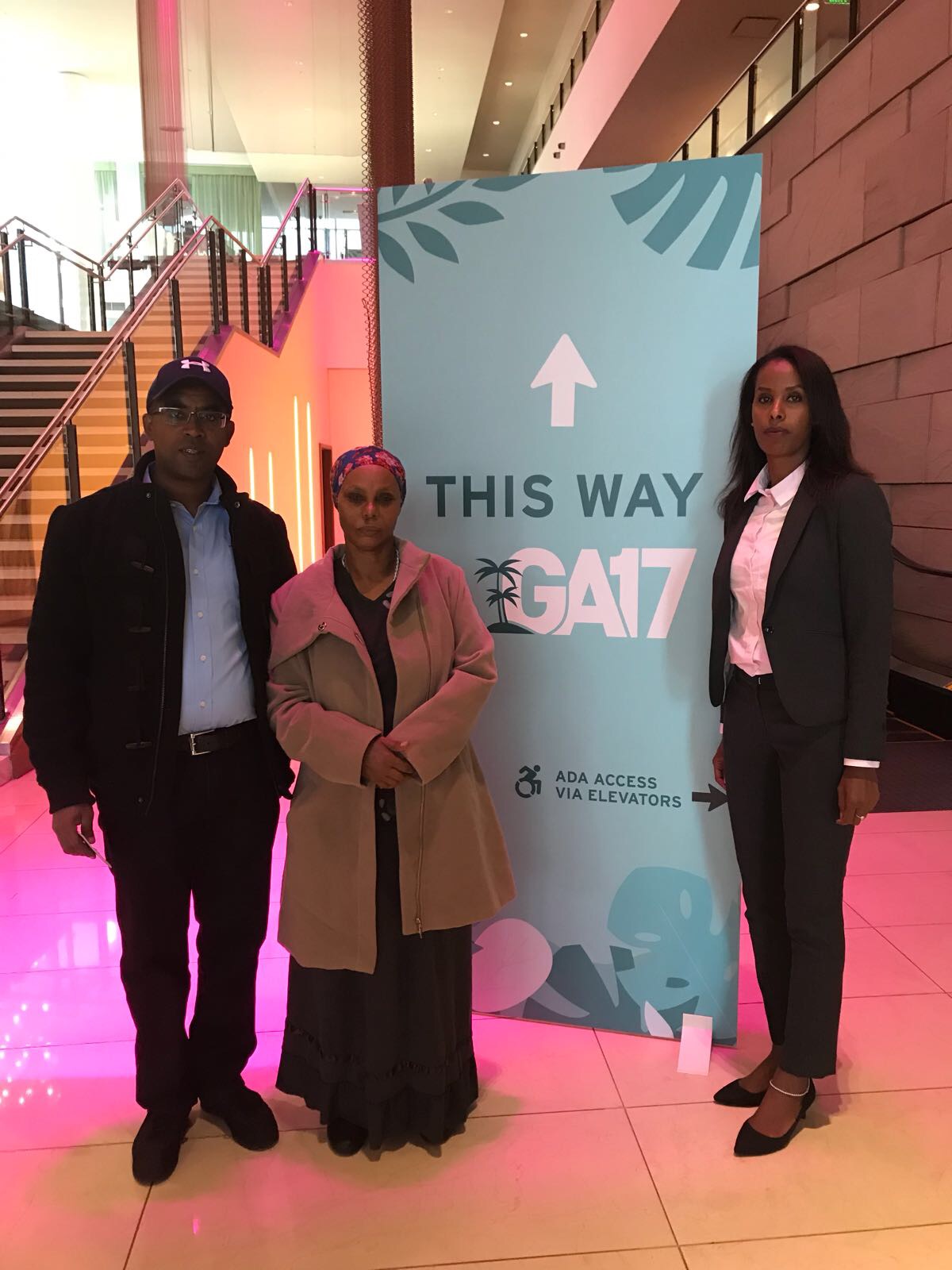
Agarnesh Mengistu is an unlikely addition to the influx of Jewish dignitaries converging on Los Angeles for the Jewish Federations of North America General Assembly (GA), which takes place from Nov. 12 to 14. The Ethiopian-born Mengistu, a mother of 10, speaks little Hebrew and next to no English, instead communicating only in her native Amharic.
She travelled to Los Angeles this month with a small entourage and a single purpose: to convince Jewish leaders to help bring home her son, or at least word of his condition and whereabouts.
In September 2014, Avera Megistu, a 31-year-old diagnosed with schizophrenia, wandered away from his family’s home in Ashkelon and crossed a border fence into Gaza, located just to the south. He is presumed by the Israeli government to have been captured by Hamas.
In the ensuring years, Agarnesh Mengistu’s life has been a series of sleepless nights and fruitless meetings with powerful people such as United Nations Secretary General António Guterres in search of help.
“All these three years, we’ve met with so many people it’s hard to remember who is who,” she said. “They tell me things: ‘We’ll look for an opening; we’ll go into Gaza; we’ll try.’ So many meetings — and no news.”
Mengistu, 67, sat in a conference room 16 floors above Wilshire Boulevard at the Israeli Consulate on Nov. 10 next to Yonit Tlayenesh Fenta, 34, a relative who coordinates the campaign to secure Avera’s release, and her son Ilan, 35, the family’s de facto spokesperson, who wore a black “Free Avera Mengistu” T-shirt over a collared blue shirt.
Agarnesh let Ilan and Fenta do most of the talking, in Hebrew and English; when she spoke, Fenta, who refers to her as dodah, or aunt, translated from Amharic into Hebrew.
Flanking the family members were two women tasked with guiding them through the world of Jewish lay leaders and international dignitaries, Ilana Mushkin, an American-born Israeli representing the well-connected alumni network of the Wexner Graduate Fellowship, and Orly Cohen Geffen, a consultant to the Israeli defense minister on missing civilians. The Defense Ministry is funding the Mengistus’ trip to America.

In addition to attending the GA, Mushkin said a second purpose of the trip was for the family to feel the “warm embrace” of the local Jewish community. She said they received an outpouring of support from the four local synagogues they visited on Nov. 11 for Shabbat, Beth Jacob, B’nai David-Judea Congregation, Pico Shul and Young Israel of Century City.
In a joint interview, the family stressed that unlike Gilad Shalit, an Israeli soldier who was captured by Hamas and freed in 2011 in exchange for 1,027 Palestinian prisoners, Avera never served in the military, having been exempted from mandatory service. “Let’s be honest, the public has some trauma from the Shalit situation, so they’re afraid of another deal,” Ilan said. “They don’t understand this is a humanitarian case.”
At the beginning, I was angry at Avera. I said to myself, ‘Of all the places you had to go off to, Gaza?” Ilan Mengistu
For 10 months after Avera crossed the border, the family cooperated with an Israeli government gag order preventing the local press from discussing his disappearance, giving the government time to work quietly towards his release. The United States tour — they plan to visit Washington and New York before heading back to Israel on Nov. 23 — represents something of a change in strategy.
“We understood that being quiet won’t bring a solution to this case,” Ilan said. “Without the will and the power of the Israeli public and the Jewish communities, I don’t believe he will return to us any time soon.”
At first, the family had been inclined to trust international aid organizations that promised to do their best to bring him home. In Ethiopia, before they immigrated to Israel in 1991 as part of Operation Solomon, the International Committee of the Red Cross (ICRC) was revered. And in September, during a trip to Israel, ICRC President Peter Maurer said the group was working towards the release of captured Israeli civilians — including Mengistu.
“We are doing all we can to relentlessly push Hamas to account for them, treat them as provided under international law and spare their families the unbearable uncertainty,” he said, according to i24NEWS.
With no news since then, the Mengistu family is losing patience.
“We’re hoping the Jewish community will step up and put as much pressure as possible on these organizations to do more,” Ilan said. “There are many human rights organizations that support Gaza every day. Where are they now?”
For now, all the family seems able to do is tell Avera’s story to as many people as possible, including Israeli President Reuven Rivlin, whom they were scheduled to meet with on Nov. 13 in Los Angeles.
Until he fell ill, Ilan said, Avera was close with his mother, sharing his pay from odd jobs to help make ends meet. He began to deteriorate in 2012, after his older brother, Michael, with whom he was close, died of a sudden illness. Avera “refused to face the reality of it,” Ilan said, throwing tantrums and yelling that he had no reason to live. He was twice hospitalized but continued to deteriorate and refused his medication.
Soon, Ilan said, “he started wandering off. It was very difficult to see him like that. We were used to seeing him at the Shabbat table and over the holidays, happy and laughing, and all of a sudden — to arrive at a situation like this…” Ilan trailed off.
Agarnesh sat with her arms crossed and hair tied back in a red headscarf, occasionally passing a white handkerchief over her face as if to revive herself from slumber. At one point, she turned to Fenta, with whom she shared a room during her trip to Los Angeles.
“You saw me yesterday at night. I couldn’t sleep — bichlal,” she said interjecting the Hebrew word for ‘at all.’ “That’s what it’s been like for more than three years already.”
“She’s at the point where she would even prefer to hear that he is dead than have this complete unknown situation,” Ilan said. “At night, she goes and looksat his bed — still empty.”
As for Ilan, his attitude has gone from anger to something approaching acceptance.
“At the beginning, I was angry at Avera,” he said. “I said to myself, ‘Of all the places you had to go off to, Gaza? You couldn’t find somewhere else?’ I know now, after time has passed, we can’t blame him.”
“Ma ani yakhol la’asot?” he added, using a common Hebrew refrain. “What can I do?”























 More news and opinions than at a Shabbat dinner, right in your inbox.
More news and opinions than at a Shabbat dinner, right in your inbox.